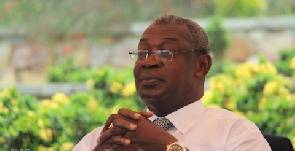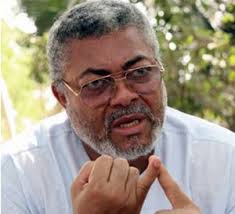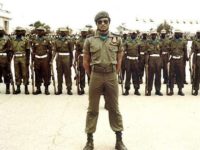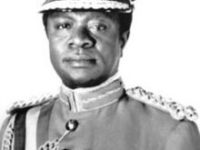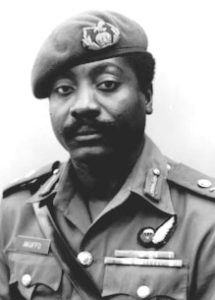 The exit of Acheampong led to the reconstitution of the Supreme Military Council with General Akuffo as Head of State and Chairman. He was sworn into office on July 6, 1978 by the Chief Justice, Justice F. K. Apaloo. Akuffo accused Acheampong of having divided the country in running a “one man show” government by taking actions without consulting other members of the SMC 1, and that his continued presence in office would impede any steps towards reconciliation. As a first step in streamlining the administration of the state, more than half of the members of SMC 1 including the IGP, J. H. Cobbina, were retired and new officers appointed to replace them. Several other serving officers who served as Commissioners in the regional ministries and institutions were recalled to barracks and their places taken over by civilians.
The exit of Acheampong led to the reconstitution of the Supreme Military Council with General Akuffo as Head of State and Chairman. He was sworn into office on July 6, 1978 by the Chief Justice, Justice F. K. Apaloo. Akuffo accused Acheampong of having divided the country in running a “one man show” government by taking actions without consulting other members of the SMC 1, and that his continued presence in office would impede any steps towards reconciliation. As a first step in streamlining the administration of the state, more than half of the members of SMC 1 including the IGP, J. H. Cobbina, were retired and new officers appointed to replace them. Several other serving officers who served as Commissioners in the regional ministries and institutions were recalled to barracks and their places taken over by civilians.
For instance Mrs. Gloria Amon Nikoi, Senior Principal Secretary of the Ministry of Foreign Affairs, took over from Col. R.J.A. Felli as Commissioner for Foreign Affairs. Mr. K. Afreh also took over from Colonel Parker Yarney. As Commissioner for Information; Anthony K. Woode replaced Commander G.E. Osei. As Commissioner for Greater Accra, Dr. K. G. Erbynn took over from Colonel W. A. Thompson. Evans-Anfom was made Commissioner for Central Region. Also affected in this exercise were Commander J. C. Addo, Chief Executive of the Cocoa Marketing Board and Major S. B. Gyasi, Executive Director of the Produce Buying Company. Commander Addo’s position was taken over by Kwame Asare Pianim whilst W. R. Koranteng, Managing Director of the Cocoa Marketing Company was made the First Deputy Chief Executive.
On May 1, 1979, the government came out with a form of “punishment” for General Acheampong. By a decree – Armed Forces Miscellaneous Provisions Decree, 1979 – the SMC II divested General Acheampong of all honours acquired by him during his tenure of office. He was to forfeit the use of any military rank and was prohibited from entering any military installation or establishment. He was to restrict his movements to his home town, Trabuom, in the Ashanti Region.
The SMC II took measures to dismantle the satellite organisations that formed the base of Acheampong’s political support. Therefore, “the Patriots”, “Organisers Council”, “The Friends”, and “Ghana Youngsters Club” were banned and their assets frozen. The assets and bank accounts of former “Special Aides” to Acheampong: S. O. Lamptey, Kwesi Ghapson, Sam Boateng, S. K. Danso and Ben Kuma were also frozen.
Even though on July 31, 1978, the SMC II proposed to return Ghana to civilian rule with a “Transitional (Interim) National Government”, having no institutional representation of the Armed Forces and the Police, it would have the mandate to rule for a period of not less than four years. However, intense pressure forced the SMC II to change this idea on November 30, 1978. The University Teachers’ Association of Ghana – UTAG, for instance, called on the government to produce a permanent constitution “reflecting, the mood of the nation for freedom of association and expression”, the National Union of Ghana Students – NUGS also added its voice to this call and reiterated the need for general elections by Universal Adult Suffrage to return the country to civilian rule by July 1, 1979.
In late October, announcements were made that local council elections would be held for the first time in twenty years and on December 13, 1978, the Political Parties Decree was passed. It banned all old political parties like the CPP, UP, NAL, and PP. On December 21, 1978, General Akuffo inaugurated the Constituent Assembly, with Justice V.C.R.A.C Crabbe as the Chairman. To facilitate its work, the Committee set up five sub-committees. They were the Drafting and Standing Orders Committee headed by Justice Crabbe, Business Committee under the leadership of Nene Azu Mate Kole, the House Committee led by D. A. Chapman-Nyaho and Committee of Privileges headed by Mrs. Justice Annie Jiagge.
On January 1, 1979, the seven-year ban on political party activities was lifted. To show its commitment to a level playing field and free and fair elections, General Akuffo had in a radio and T.V. broadcast on the eve of 1979 declared: “The Government of the Supreme Military Council will not in any way be involved in the organisation of any political party nor shall we interfere in any way with the political campaign that will ensue. However, under the reports of the Elections and Public Officers Disqualification (Disqualified Persons) Decree of 1978, (based on the Taylor and Aidoo Assets Committees, the Commission of Enquiry into Builders Brigade, the Jiagge, Manyo Plange and Sowah Assets Commissions and the Kwame Nkrumah Properties Commission), 195 people against whom adverse findings were made, were disqualified from engaging in party politics. Symbols of former political parties were also banned. Tribunals were later set up to reconsider the adverse findings made against those banned under the above mentioned Decree and review the earlier decision where necessary. Thus the previous ruling against someone like Victor Owusu was reversed.
General Akuffo employed orthodox devices to implement his economic policies. To curtail inflation, he reduced the monetary supply by holding back increases in government expenditures to 11 per cent in 1978-1979 (in contrast to 59 per cent the previous fiscal year), which in turn necessitated a clampdown on government borrowing from the Central Bank. In August, 1978, Akuffo devalued the cedi by 58.2 per cent against the US$, (i.e from 1.15 to 2.75). Earlier in June, 1978, the SMC II suspended the SUL and cancelled tax concessions on imports. And to streamline the distribution of essential commodities, special import licenses worth C6.76 million were granted to 21 selected firms, including GNTC, Kingsway, SCOA and PZ to import commodities to forestall shortages.
Moreover, in January 1979, the government banned 7,000 briefcase-bearing businessmen whose companies fell below categories A5, B4 and B5 to streamline the import trade. From this time onwards, the Ministry of Trade took over as the only import license issuing agency. To re-establish Ghana’s international economic credibility, which had been damaged by Acheampong’s debt repudiation, Akuffo appointed on July 19, 1978, a 10-member National Economic Advisory Committee chaired by the Commissioner of Economic Planning, Dr. J. L. S. Abbey to advise his government on measures to rehabilitate, resuscitate and stabilise the economy with a view to putting it on a sustainable growth path.
Interest rates were increased to encourage savings and commercial lending rates were raised. By these austerity measures inflation dropped to 78.8 percent by May 1979 from the over 100 per cent during Acheampong’s time. In support of the government’s efforts at improving the economy, the IMF granted a loan of $97 million to be drawn on Special Drawing Rights of $53 million beginning January 1979. The US government gave a loan amounting to $23 million to assist the country’s agriculture, health and education programmes.
The Council also improved tax collection by re-assessing the taxable income of all companies, many of who had under-declared their income. Consequently, two naturalised Ghanaian businessmen, M.F. Fattal and his brother Mahmoud who were found to owe 4 million Cedis in tax arrears had their assets frozen and their citizenship revoked. Their group of companies was ordered to pay a penalty of over 6 million Cedis for false declaration and evading import duty. Jamil Ashkar, a Lebanese, was not only ordered to pay 1.1 million Cedis in tax arrears but was deported after he was found guilty of tax evasion.
The Council eliminated market women from the textile distribution trade and abolished in July, 1979, the “chit” system. To increase production in the agricultural sector, the SMC II allocated 15.8 million for crop development and 16.4 million for livestock development in the 1978/79 fiscal year. The morale of cocoa farmers was boosted when the producer price, of cocoa was in September 1978, increased from C40 to C80 per 30 kilogramme bag.
The government also embarked upon demonetisation aimed at getting rid of large hordes of illegal, cedi holdings both in and outside the country and to further strengthen the currency by reducing the excess liquidity in the system. On March 5-9, 1979, by the Cedi (New Notes) Decree 1979 (SMCD) 226, people were made to send to the banks C100 in return for C70.00. However, all amounts in excess of 5,000 was to be exchanged at a ratio of 5:10, that is for every 100 after one has changed up to the tune of 5,000 he or she was to receive 50 of the new notes. Though by April 9, 1979 there was a reduction by 30% in excess liquidity, the policy did not work because inflation began to rise again. Earlier in October 1978, the effects of these measures especially the August devaluation had become pronounced as the prices of consumer goods doubled and even quadrupled in some cases. The hardships were felt by every segment of Ghanaian society; with the urban dweller being the hardest hit. Discontent became widespread among the people. It was therefore not surprising that between August and November 1978 the country recorded eight strikes involving over 70,000 workers. The most serious of the strikes were those by the workers of the postal services, the Electricity Corporation and GIHOC. The main aim of the strikers was to secure a pay rise to meet the cost of living which rose sharply after the August 1978 devaluation of the cedi against the US dollar.
Unable to manage the situation, the government declared a state of emergency and passed the Emergency Decree of 1978 which outlawed strikes and other forms of protest and declared damage to property as a criminal act and against the security of the state. The government began to play down the effect of this situation by beginning to recruit new employees to fill the jobs held by the striking civil servants. The Decree also granted the government the right to detain people without trial restrict the movement of citizens and control property.
With a constitutional provision which indemnified the NRC/SMC I and SMC II and other previous military regimes and the government’s refusal to prosecute Acheampong and others who, by every indication, were engaged in corruption and other socio-economic crimes against the state, it dawned on Ghanaians that General Akuffo and the other members of SMC II had themselves been corrupt under the previous regime. Tension, therefore, never abated as the people became convinced that they (members of NRC/SMC I & II) wanted to go unpunished after looting the national coffers. It, therefore, came as no surprise when on May 15, 1979; Junior Officers of the Air Force led by Flight Lieutenant Jerry John Rawlings attempted a coup d’etat against the SMC II. Though the coup was foiled, the plotters, as expressed by Mr. Aikins, Director of Public Prosecutions, were worried not only about the injustices in the Ghanaian society but also the tarnished image of the Ghana Army due to malfeasance on the part of members of the government.
On the morning of June 4, 1979, when the court-martial trying Rawlings and his accomplices was to resume sitting, another group of Junior Officers and regular soldiers led by Major Boakye Gyan released Rawlings and his men from prison. The troops gained control of the Ghana Broadcasting Corporation, but were temporarily dislodged by troops loyal to the SMC II under the command of Major General Odartey-Wellington, and then succeeded in recapturing it at 11 a.m. Skirmishes took place throughout the day, leading to Odartey Wellington’s death at the Nima police station, where he had taken refuge after running short of ammunition. It led to the arrest of many SMC II affiliates, and eventually to its overthrow. To avoid further bloodshed, Major-General Joshua Hamidu, CDS came on air at about 8.30 p.m. to confirm the success of the coup d’ etat. He urged all those still fighting in support of the SMC II to stop firing and return to barracks.
